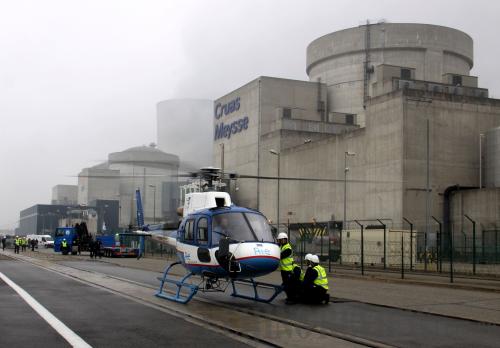|
 |
|
EXERCISE: Members of the French nuclear rapid response team take part in an emergency drill at the Cruas Nuclear Power Station in Ardeche in south France in October 2011 (SHU SHI) |
 Representatives from more than 50 countries and four international organizations—the UN, the International Atomic Energy Agency (IAEA), the EU and the International Criminal Police Organization—attended the Second Nuclear Security Summit in Seoul on March 26-27. Representatives from more than 50 countries and four international organizations—the UN, the International Atomic Energy Agency (IAEA), the EU and the International Criminal Police Organization—attended the Second Nuclear Security Summit in Seoul on March 26-27.
They met at a time when the horrors of the Fukushima nuclear disaster in Japan last year continue to haunt the world and deadlock over the North Korean nuclear issue persists. Against this backdrop, the summit, originally designed to address the threat of nuclear terrorism, took on broader dimensions.
Since the Cold War came to an end in the early 1990s, nuclear terrorism has been one of the most pressing security concerns of the United States. In April 2009, U.S. President Barack Obama put forward his vision of a nuclear-free world in a speech in Prague. He said the international community should make new efforts to deal with nuclear terrorism and ensure the security of nuclear materials and related facilities. A year later, the United States hosted the First Nuclear Security Summit in Washington, D.C. with the aim of making nuclear security a global concern.
The United States insisted that the summit focus on nuclear terrorism, fissile material protection and the prevention of illegal trade in radiological substances, while the topics of nuclear disarmament and non-proliferation were excluded. It invited only countries with high stakes in international nuclear security to the summit in the belief that it would be easier to reach consensus with these countries.
The summit also showed Washington's other purposes. In addition to combating nuclear terrorism—the common challenge of the international community, Washington tried to make its own initiatives international rules. It also wanted to promote U.S.-dominated arms control policies worldwide. Moreover, it intended to strengthen cooperation with other countries, especially big powers such as Russia, China and the EU, to gain their support politically, economically and technically.
In a joint communiqué, participants of the Washington Nuclear Security Summit declared that nuclear terrorism is one of the most challenging threats to international security, and strong nuclear security measures are the most effective means to prevent terrorists from acquiring nuclear materials. They also adopted a work plan, which included agreements on more than 50 specific nuclear security cooperation measures in 11 fields. The summit met Washington's expectations, as it thrust U.S. nuclear security concerns into the global spotlight.
But since views on nuclear terrorism vary greatly from country to country, agreements reached in Washington have not been effectively implemented in the last two years. For some countries, the task of fissile material protection is not as urgent as the United States and Russia. Efforts in Mexico, Russia and the United States to convert research reactors fueled by highly enriched uranium to use low enriched uranium have been unsuccessful due to technical and financial reasons.
| 